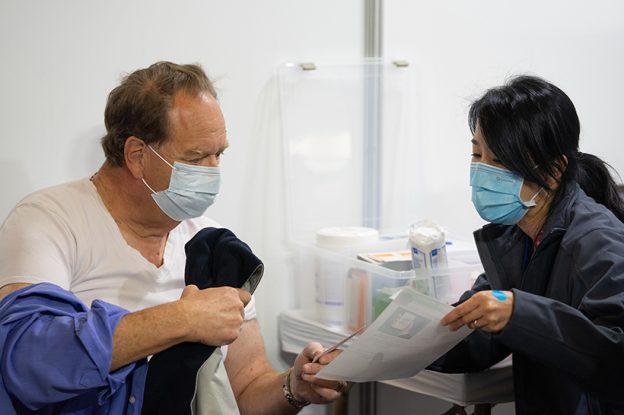
3 doses of Pfizer–BioNTech COVID vaccine better than 2
A Kaiser Permanente study published February 14, 2022, in The Lancet Regional Health – Americas found that 1 month after a third dose, the Pfizer-BioNTech COVID-19 vaccine effectiveness is higher for preventing infection and hospitalization than 2 doses of the vaccine after 1 month.
“When we looked at the effectiveness of the 2 doses of Pfizer–BioNTech vaccine versus 3 doses, we see a benefit with 3 doses that exceeds that achieved with 2 doses alone,” said Sara Y. Tartof, PhD, an epidemiologist with the Kaiser Permanente Southern California Department of Research & Evaluation and a member of the faculty of the Kaiser Permanente Bernard J. Tyson School of Medicine, both in Pasadena.
This study assessed the primary series of 2 doses of the Pfizer-BioNTech COVID-19 vaccination effectiveness against infection, hospitalization, and death up to 8 months after vaccination, and also assessed the effectiveness of 3 doses of the vaccine up to 3 months after vaccination.
To assess effectiveness, this research study evaluated electronic health records of 3.1 million members of Kaiser Permanente in Southern California from December 14, 2020, to December 5, 2021. During the study period, 197,535 (6.3%) patients were infected with SARS-CoV-2, and of those, 15,786 (8%) were admitted to the hospital. During the study period, the predominant variant was delta, and not omicron.
- Two-dose vaccine effectiveness against infection declined from 85% during the first month after vaccination to 49% up to 8 months following vaccination.
- Two-dose vaccine effectiveness against hospitalization remained high (90%) throughout the 8 months and did not wane, except among people who were 75 years of age and older, or who had compromised immune systems.
- For people who were immunocompromised, the protection against hospitalization dropped to 74%, and for those 75 and older, it was 77%.
- Three-dose vaccine effectiveness was 88% against infection and 97% against hospitalization within the first 3 months after vaccination.
“What we see from this research is that the public health impact of a third dose to prevent severe disease is substantial,” Tartof said. “Importantly, all studies that have evaluated the vaccine effectiveness of a third dose — including ours — have shown a meaningful improvement in vaccine effectiveness against a broad range of SARS-CoV-2 outcomes.”
In addition to Dr. Tartof, additional authors include Jeff M. Slezak, MS, Vennis Hong, MPH, Harpreet Takhar, MPH, Oluwaseye A. Ogun, MD, Sarah Simmons, MPH, of the Department of Research & Evaluation; Laura Puzniak, PhD, Joann M. Zamparo, MPH, Sharon Gray, MS, Srinivas R. Valluri, PhD, Kaije Pan, MS, Luis Jodar, PhD, and senior author John M. McLaughlin, PhD, of Pfizer Inc., Collegeville, Pa.; Timothy B. Frankland, MA, of Kaiser Permanente Center for Integrated Health Care Research, Honolulu, Hawaii; and Bradley K. Ackerson, MD, of Southern California Permanente Medical Group, Harbor City, Calif.





